- Home
- Charles de Lint
Trader
Trader Read online
$24.95 ($34.95 CAN) 0-312-85847-7
Charles de Lint, founder of the urban fantasy movement, continues to hone and polish the art that created such critical and popular triumphs as Moonheart, The Little Country, and Memory and Dream. As Booklist says, “It is hard to imagine urban fantasy done better than it is by de Lint at his best.” “De Lint is a master of the modern urban folk tale,” says The Denver Post. In Trader, de Lint breaks new ground, telling the compelling story of a change of souls.
Max Trader is a luthier, a maker of guitars. Johnny Devlin is chronically unemployed. Trader is solitary, quiet, responsible. Devlin is a lady-killer, a drunk, a charming loser. When they inexplicably awake in each other’s bodies, Devlin gleefully moves into Trader’s comfortable and stable existence, leaving Trader to pick up the pieces of a life he had no part in breaking. Penniless, friendless, homeless, Trader begins a journey that will take him beyond the streets of Newford to an otherworld of dreams and spirits, where he must confront both the unscrupulous Devlin and his own deepest fears.
This is a novel of identity, an adult coming-of-age story in which a man discovers his own hidden strengths with the aid of a strange and wonderful community of unexpected friends...and of a beautiful musician who is willing to follow him beyond the boundaries of the world.
“There is no better writer now than Charles de Lint at bringing out the magic in contemporary life,” says Orson Scott Card. And Trader confirms, yet again, why.
Novelist, poet, artist, and musician, Charles de Lint is one of the most influential fantasy writers of his generation. With such warmly received works as Spiritwalk, Moonheart, Dreams Underfoot, and The Ivory and the Horn, he has earned high praise from readers and critics alike. The Magazine of Fantasy and Science Fiction writes: “De Lint shows us that, far from being escapism, contemporary fantasy can be the deep, mythic literature of our time."
De Lint and his wife, the artist MaryAnn Harris, live in Ottawa, Ontario, Canada.
Jacket art by John Howe
Jacket design by Martha E. Sedgwick
A TOR® HARDCOVER
Distributed in the United States by
St. Martin’s Press
175 Fifth Avenue
New York, NY 10010
Distributed in Canada by
H. B. Fenn and Company, Ltd.
Printed in the USA
TRADER
BY CHARLES DE LINT FROM TOM DOHERTY ASSOCIATES
Dreams Underfoot
The Fair at Emain Macha
Into the Green
The Ivory and the Horn
Jack of Kinrowan
The Little Country
Memory and Dream
Moonheart
Spiritwalk
Svaha
This is a work of fiction. All the characters and events portrayed in this novel are either fictitious or are used fictitiously.
TRADER
Copyright © 1997 by Charles de Lint
All rights reserved, including the right to reproduce this book, or portions thereof, in any form.
This book is printed on acid-free paper.
A Tor Book
Published by Tom Doherty Associates, Inc.
175 Fifth Avenue
New York, NY 10010
Tor Books on the World Wide Web: http: //www.tor.com
Tor® is a registered trademark of Tom Doherty Associates, Inc.
Design by Sara Stemen
Edited by Terri Windling
Library of Congress Cataloging-in-Publication Data
De Lint, Charles.
Trader / Charles de Lint. — 1st ed.
p. cm.
“A Tom Doherty Associates book.”
ISBN 0-312-85847-7 I. Title.
PR9199.3.D357T73 1997 8i3'-54—dc2o 96-30646
CIP
First Edition: February 1997
Printed in the United States of America
135798642
for
Grit
luthier, musician, author;
good guy extraordinaire
ACKNOWLEDGMENTS
I’d like to thank luthiers Grit (William Laskin in his official guise) and Ed Dick for input into the luthier’s craft, as well as for some general conversations that helped bring Max Trader and his plight more to life in my mind while I was writing. Needless to say, anything I might have gotten wrong is solely my responsibility.
I should also mention that the city, characters and events to be found in these pages are fictitious. Any resemblance to actual persons living or dead is purely coincidental. In other words, to the best of my knowledge, Grit, Ed and any other instrument makers I happen to know are exactly who they are supposed to be.
And if any of you are on the Internet, come visit my home page. The URL (address) is http://www.cyberus.ca/~cdl.
—Charles de Lint
Ottawa, summer 1995
CONTENTS
SHIFT
THE CENTER CANNOT HOLD
OWNING YOUR OWN SHADOW
WALKING LARGE AS TREES
Denied our names, our faces,
we lie in the graves of our identity
with a stranger’s pennies on our eyes,
seeking to reclaim ourselves
from the spaces between
what we remember doing
and what we yet might do.
—Wendelessen, from “The Graves of Strangers”
Your treasure house is within;
it contains all you will ever need.
—Hui Neng
SHIFT
Whatever I may be
I meet him.
He is no other than myself
Yet I am not he.
—Dōsan, thirteenth century
1 MAX TRADER
If dreams can be portents of what is to come, then I had my fair share of forewarning before my life was stolen away.
Each night, for the week preceding the event, I found myself returned to the workshop of my old mentor. Janossy was ten years dead, the workshop in the old outbuilding long gone, man and farm swallowed by the past, yet here he stood before me. Here was the sunlight spilling in through that splendid skylight high overhead, diffused and muted a hundred shades of green and yellow by the boughs of the maples overhanging the workshop. Here was the long pine workbench, covered with wood, shavings, tools and sawdust, the back of a guitar the only recognizable shape amidst the clutter.
I remember that guitar. Janossy never did finish it, but I did. He was working on it when he died, the top and sides, braces and bridge, a one-piece back. It was the perfect guitar body and deserved the perfect neck. I came close, but I couldn’t match his workmanship, couldn’t match the neck he would have given it. In the dreams, he’s still working on it.
Sandor Janossy had been an enormous man with a temperament to match, embracing everything that touched his life with a huge enjoyment that was evenly matched in its intensity by the strong contemplative side of his nature. He had lived with the immediacy of a Zen master in an everpresent now, viewing the world through the artless eyes of a child, seeing, rather than looking. Which wasn’t to say that he was simple—or at least not in a pejorative sense. Instead he resisted complications, refused to be drawn into their snare.
“When you understand how everything in the world connects to everything else,” he told me once, “you have little patience for more divisive points of view.”
Case in point: the luthier’s craft. Everything connects. Janossy was able to read the wood with a kind of feng shui geomancy, finding in its grain energy nodes connected by lines as invisible, but no less potent, than the ley lines or Chinese Dragon paths that dowsers have found crisscrossing the earth. Building the perfect instrument is a matter of connecting those nodes, maintaining the energy flow betwe
en back and top and sides, between neck and finger board and the main body of the instrument. When the nodes connect favorably, when the alignment of the ley lines within the wood are at their optimum, the instrument becomes a mirror that reflects the spirit of the music called up from it in the same way that the adherents of feng shui believe what we do here on earth is mirrored by the astrological powers of the heavens.
Heady stuff for the young man I was when I first came to study under him—more so when I finally understood the ability firsthand.
“The master woodworkers all know this,” Janossy would tell me. “Perhaps not in so many words, but they know when a wood will work with another and when it won’t. They know that it’s not simply the design or the thickness of the wood or the varnish that gives an instrument its heart and soul, but something else that lies hidden deep in the grain, something visible only when you know to look for it. Something that connects only when you understand the connection.”
I’ve missed working with him, missed hearing his voice, missed viewing the world with that vision peculiar to his way of seeing that he was always willing to share with me. Returned to his company, howsoever briefly, even through dreams, I realized just how much.
But I knew I was dreaming. All the time, I knew. Not because I have the clarity of moving through my dreams the way a lucid dreamer does, but because Nia was in these dreams as well, sitting in a corner of Janossy’s workshop the same way she sits in a corner of mine most afternoons after school, a misplaced figure of Gothic Bohemia here, all pale skin and black clothes and dark hair starkly juxtaposed against the warm buttery colors of the workshop.
Her presence was what told me I dreamed. Nia was barely out of her diapers by the time Janossy died, which would make it impossible for her to meet him in this way. And consider this: while she loves to hold forth while I’m working, in these dreams she’d be remarkably quiet, sitting there, hands folded almost primly on her lap, listening to Janossy with the same happy interest as I did.
What did he tell us? It’s difficult to articulate, because what he said faded the same way that dreams can once you waken, the way my dreams almost invariably do. But I remember he seemed to be concerned about something. Seemed to be warning me about something. Or maybe that’s only the meaning I gave the dreams later. I can’t be sure now. All I knew then was that I’d wake up disappointed every morning, wake up and know it had been a dream, no more. Janossy was still dead, the farm was sold and gone and all I had of him is what he left me: the tools he passed on to me and my memories. Nothing has changed. Everything remains the same as always.
Until one night I wake from that dream to find myself in a stranger’s room.
I sit up slowly, taking in my surroundings with mounting confusion. I know the momentary disorientation that can come from traveling or sleeping over at a friend’s, that moment of half-asleep shock that quickly dispels once you realize where you are. But this is different. I haven’t been traveling or visiting anyone. I’d spent the evening in my workshop, designing the inlay pattern for a mandolin that I was in the final stages of completing; then I went to bed in my own apartment, above the shop.
The stuttering light that comes in from the red neon sign outside the window of this room illuminates nothing even vaguely familiar. Not the bed, the furnishings, the posters on the wall. I don’t know how anyone could fall asleep with a poster from one of the Aliens movies hanging over their bed. I certainly couldn’t have—if I’d ever been in this room before, which I hadn’t.
So this is impossible. More of the dream, I think, that’s all, except now I’ve left Janossy and Nia behind and moved on to something new. But this dream has what the other didn’t: I can taste my fear. I can smell the room. A trace of aftershave I don’t use or recognize. The vague locker-room odor of a room that hasn’t been aired in too long.
There were no smells in the dreams of Janossy.
But it must be a dream, for nothing else makes sense. I pinch myself, but it does no good and feels too real. It doesn’t help at all. I’m still not where I should be, in my own bed.
I look slowly from the grotesque poster to my reflection in the dresser mirror across the room. I can’t look away. My heartbeat goes still and a deathly silence thickens around me. My ears fill with pressure. My lungs refuse to work and added to the room’s unpleasant smell is the sudden sour odor of wet clay.
Deliberately I lift my arm. The reflection follows suit. I let the arm fall to my side again. I shake my head, unwilling to accept what I’m seeing. I want, more than I’ve ever wanted anything before, to turn away from the mirror, but my gaze is locked on the reflection I cast upon its surface with the same numbed fascination as one might view the scene of a particularly grisly accident. This goes beyond the impossible.
The face looking back at me isn’t my own. It doesn’t belong to anyone I have ever seen before in my life. Instead of my own features, I see those of a stranger reflected in the glass: early thirtysomething, which makes him at least five years younger than my own thirty-eight; hair, thick and dark, unruly from a night’s sleep; face, handsome with chiseled features, cheeks and chin bristly with dark stubble; eyes appearing almost black in the poor light; nose, prominent and wide at the base; lips, sensual, but the mouth a bit too wide for the face.
I feel like one of Rod Serling’s hapless characters from an episode of The Twilight Zone. Slowly I get out of a stranger’s bed and walk toward the mirror in a stranger’s body. I lean close up to it, fingers stretched out until they meet the fingers of the stranger reflected on the cool surface of the glass.
I have to be dreaming, but I know in my heart I’m not. Not anymore. Janossy’s workshop is long fled. So that means...that means I...
My lungs, once so still, begin to hyperventilate, drawing air in and out of the unfamiliar body I’m wearing at such a rapid rate that I sink to my knees in front of the dresser. I have to lean my head down upon its wooden top. The faint mahogany smell helps to center me. Something is wrong. Something is terribly wrong here, but the smell of the wood assures me that however alien the world has become, I’m not crazy. I might not recognize this room, or the body I’m wearing in it. The situation in which I find myself might be impossible. But it doesn’t disprove what I know to be real. I have a past that doesn’t incorporate this body or room. I have memories of an entire other life—my real life. I have no explanation for what’s happened to me, but that doesn’t change what I know to be true.
I’m not the man in the mirror. This isn’t my bedroom. My name is Max Trader. I’m a luthier. I live someplace else. No matter what my senses are telling me, those are the facts and they can’t be changed. They’re irrefutable. The smell of the wood assures me they’re true, for it was the smell of the wood that seduced me as a boy and so became an ongoing mainstay of my life, defining who I am. If I can’t believe the wood, then everything I’ve ever known is a lie and that I refuse to accept.
No. I know this: Wood, the smell of it, doesn’t lie. Freshly cut, with a saw, a chisel, a knife, roughly planed or sanded as smooth as a child’s cheek. The sappy aroma always rises up into my nostrils, crowding out all other impressions. And if I mean to work that wood, then I apply what I’ve learned from my father and Janossy. First I have to crawl inside the wood and understand it from the inside out, for each piece is particular to itself. The swirling whisper of its grain, the resonance of its molecules vibrating against my fingers, and always the smell, the forest, the wood, the tree, distilled into that deep rich scent that rises from the smallest sliver that might lie in the palm of my hand.
Wood, its smell, working with it, handling it, taking tools to it, shaping it, once saved my life. Or at least saved what was left of my family which, at the time, was pretty much the same thing.
My mother’s name was Abigail and she died when I was nine. She was found to have abdominal cancer, the growth was removed, the operation successful. But a year later, a checkup revealed the cancer had spread all over her
internal organs. Her dying took several months. The loss of her broke my father, broke the bond that had knitted my family together the way disparate threads are woven together on a loom, entwined until they become one piece of cloth. When she died, the cloth unraveled into shreds.
My father’s name was Jacob and he was a cabinetmaker, from a long line of cabinetmakers, but there was little work for him in his craft in those days. After the death of my mother, he returned to working on construction sites by day, a silent and withdrawn figure now, distanced from the rough camaraderie of his coworkers, but a hard worker. It was only in the evenings that he could retreat to his workbench in the basement and if not find ease, at least temporarily forget his grief through the use of his tools and the richly ornamented furniture he made.
One evening, when I was eleven, I closed my schoolbooks, turned off the television set and went down the basement stairs to my father’s workshop. My father looked up, but I said nothing. I sat down on a wooden stool in a corner, out of the way, hands folded on my lap—as quietly attentive as Nia in my dreams. My father regarded me for a long moment, then nodded slowly and returned to his work.
That was where the smell of the wood had first seduced me. That was where the familial bond was reknitted, where the distance between my father, myself and the memory of my mother was healed, not through words, but through the wood. Butternut, lacewood and mahogany. Bird’s-eye maple, red birch and hickory. We worked there together, boy and man, side by side at the long bench, making the cabinets and cupboards that grew increasingly more in demand until my father could quit the chancy employment at construction sites and devote his days to cabinetmaking full-time. Until I realized that it wasn’t furniture that I wanted to wake from the wood, but music. I already played the guitar and, though not as well, a half-dozen other related stringed instruments; now, I slowly came to understand, I needed to learn how to actually build the objects that produced the sounds.

 Widdershins
Widdershins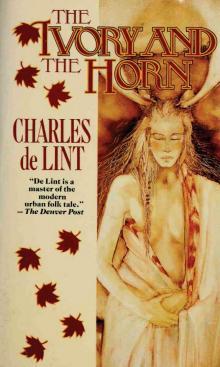 The Ivory and the Horn
The Ivory and the Horn Yarrow
Yarrow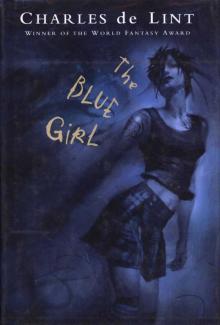 The Blue Girl
The Blue Girl Spirits in the Wires
Spirits in the Wires The Painted Boy
The Painted Boy The Little Country
The Little Country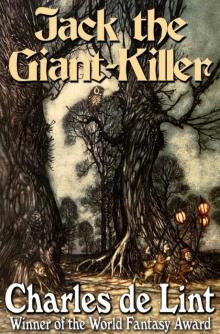 Jack of Kinrowan: Jack the Giant-Killer / Drink Down the Moon
Jack of Kinrowan: Jack the Giant-Killer / Drink Down the Moon Moonheart
Moonheart Dreams Underfoot
Dreams Underfoot Into the Green
Into the Green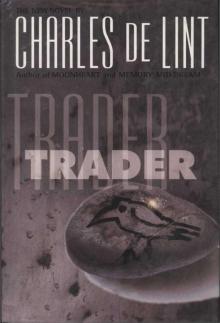 Trader
Trader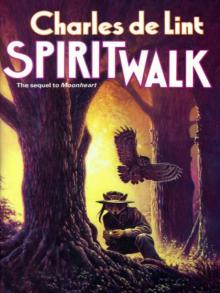 Spiritwalk
Spiritwalk Someplace to Be Flying
Someplace to Be Flying Jack in the Green
Jack in the Green The Valley of Thunder
The Valley of Thunder Out of This World
Out of This World The Cats of Tanglewood Forest
The Cats of Tanglewood Forest Seven Wild Sisters
Seven Wild Sisters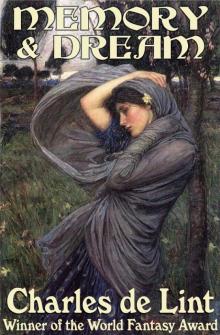 Memory and Dream
Memory and Dream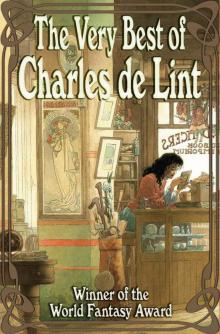 The Very Best of Charles De Lint
The Very Best of Charles De Lint Under My Skin
Under My Skin Forests of the Heart
Forests of the Heart The Newford Stories
The Newford Stories Moonlight and Vines
Moonlight and Vines Angel of Darkness
Angel of Darkness The Onion Girl
The Onion Girl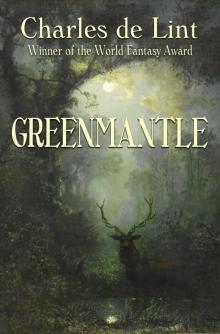 Greenmantle
Greenmantle Waifs And Strays
Waifs And Strays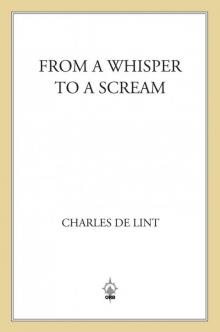 From a Whisper to a Scream
From a Whisper to a Scream Over My Head
Over My Head The Ivory and the Horn n-6
The Ivory and the Horn n-6 Our Lady of the Harbour
Our Lady of the Harbour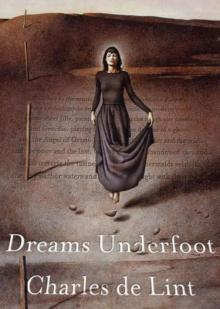 Dreams Underfoot n-1
Dreams Underfoot n-1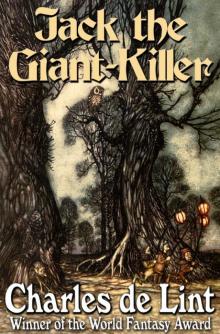 Jack the Giant-Killer (Jack of Kinrowan Book 1)
Jack the Giant-Killer (Jack of Kinrowan Book 1)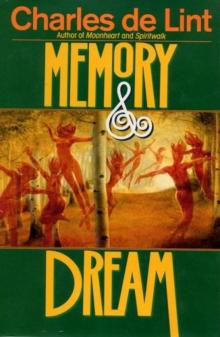 Memory and Dream n-5
Memory and Dream n-5 Under My Skin (Wildlings)
Under My Skin (Wildlings) Newford Stories
Newford Stories The Wind in His Heart
The Wind in His Heart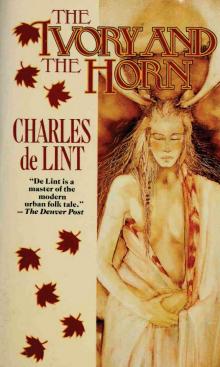 Ivory and the Horn
Ivory and the Horn